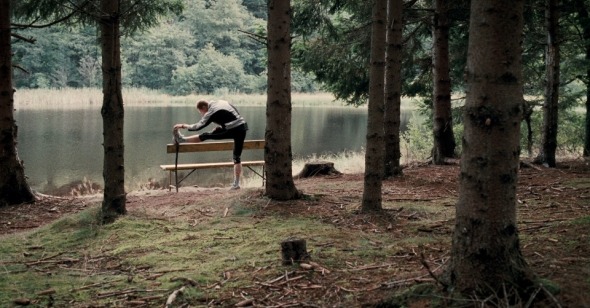Into the Woods
by Leo Goldsmith
Revanche
Dir. Götz Spielmann, Austria, Janus Films
As cinematic revenge-seekers go, Johannes Krisch’s Alex, the protagonist of Götz Spielmann's Revanche, is something of an anomaly. If the signature gesture of Lee Marvin's character, Walker, in John Boorman's Point Blank is his bloody-minded march toward personal satisfaction, and if that of Michael Caine’s titular character in Mike Hodges’s Get Carter is a violent gnashing of teeth, then the analogous physical activity for Alex is moody wood-chopping. Diligent and meditative, Alex's chore is an odd mix of domesticity and intensity, mirrored throughout Spielmann's intimate, but nervy film, which follows the taciturn, furrow-browed bank robber from the brothels of Vienna to the heavy quiet of the Austrian countryside where he takes refuge.
But unlike the avenging devils that preceded him, Alex is not really much of a tough guy. As his boss, bordello-owner Konecny, tells him, “Your problem is [that] you're too soft. You want to be tough, but you're not. People can tell immediately.” By night, Alex is an aging errand boy at Konecny's cathouse, Cinderella, lugging boxes, slapping drugged hookers into activity, and watching over a Ukrainian prostitute named Tamara, who is secretly his girlfriend. By day, he loafs around his grim, featureless apartment with Tamara, screwing, eating pizza, and hatching hare-brained schemes to get rich and flee the city.
Just how all this unravels requires almost half of Revanche’s duration, a set-up which the film's second half rewinds and redresses. One is tempted to lazily describe this narrative arc — both ineluctably circuitous and surprisingly linear — as novelistic, but perhaps that's only because it refuses to simply ride a single note for too long, instead allowing events to build and spiral in different directions among the characters. What begins as a slice of gritty urban life or a film about lovers on the run is immediately upended with the chillier social commentary of suburban melodrama, which itself gives way to a heist picture, a psycho-sexual thriller, a brooding Tarkovskian mood-piece, and so on.
Even so, Revanche never feels like it's trying too hard, never fails to root what may have seemed genre-hopping gimmickry in its characters (both major and minor) and the repercussions of their actions. In the city, we have the scary softy Alex, the shrewd and insouciant Tamara, and the gabby but scrupulous Konecny; in the country, we meet suburban hausfrau Susanne and her cocksure policeman husband, Robert. Each of these fits neatly into an intricate and achingly subtle program of events which, given Spielmann's country and his fondness for pairing formalism with suspense, one is bound to compare the work of Michael Haneke. But Spielmann's sense of character, if not of plotting, is far less predetermined than his more celebrated fellow Austrian; his generosity to his characters' idiosyncrasies, even within the strictures of their social environment, is capacious, giving his actors much more room to operate.
Indeed, Spielmann's characters are so incredibly rich, and the actors so at home in them, that they’re often able to demonstrate different facets of their personalities all at once: a social persona gives way to a more intimate one; neighborliness to lust; rage to empathy. Krisch's performance as Alex, in particular, is riveting to watch, but it's somehow Monika Buttinger's costume design that makes everything work: though Alex's brooding glare and greasiness lend him a pungent air of Colin Farrell sleaze, his A-shirt and hoodie combination make him look more like a 16-year-old skate-punk than a thug. The result is incredibly endearing, even as his hyperactive wood chopping and incessant busy-ness make him appear edgy and unpredictable. Comparing his surface-nerviness to the film's otherwise subdued tensions, which resonate in the beautifully enveloping sound design, it almost seems like Alex has found himself in the wrong movie. But Karina Ressler's deeply ironic editing—which shares some of the scalpel-precision of Haneke's work with Nadine Muse—seems to conspire with the characters instead of against them. What results is nothing short of revelatory, a non-dogmatic and warmly humanist morality tale, a weirdly funny character study, and a revenge tale that's oddly, breathtakingly soft.
